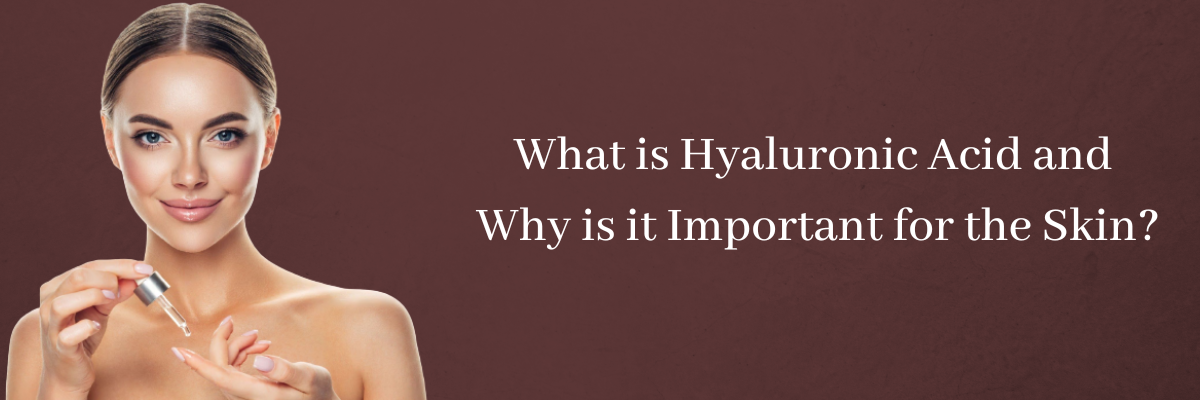You must have heard about hyaluronic acid quite often lately. It is everywhere. On moisturiser hoardings, in serum ads, and on Instagram influencers’ faces… but what exactly is this ‘hyaluronic’ acid? Being an acid, why is it supposedly promoted to be amazing? If you have also wondered about this then you have come to the right place to find answers. Because the topic for this blog is simple — what is hyaluronic acid and why is it important for the skin?
Hyaluronic Acid
First: how is it pronounced?
Repeat then — hi-ah-lew-ron-ic. Repeat. Pronounce. Repeat!
Chemically they also call it hyaluronate, and it is a completely naturally-occurring substance. This acid is produced by the human body in places like the eyes, the joints and skin cells. The acid is known to be among the best moisturisers there are, as it is slippery and helps the joints remain lubricated and hydrated.
Why is Hyaluronic Acid Important for the Skin?
- The nature of hyaluronic acid is to draw water in and lock it. This property makes it a great topical moisturiser for your skin on the cellular level.
- This acid is so potent, that a quarter of a teaspoon can hold a whole lot of water (think half a gallon).
- Therefore, when applied to your skin regularly, hyaluronic acid moisturises it (inside and out), making the skin more supple, appear soft, smooth and hence glowing.
- The result? Reduction in fine lines, wrinkles and leathery appearance of the skin. Therefore they use hyaluronic acid in moisturising as well as anti-aging products.
- The most common skincare products that use hyaluronic acid are moisturisers, creams, serums, masks and face oils.
- A recent research also suggests that hyaluronic acid helps in wound healing and the reduction of scars. Hence it is used for acne too.
Safety of Hyaluronic Acid
Compared to a lot many other similar ingredients, hyaluronic acid is safe. We can cite a number of researches to say that this acid is safe to be used topically and doesn’t show any severe side effects. In fact, rarely does it show any adverse reactions. It is also considered safe for use by conceiving, pregnant and breastfeeding women. But do inform your caregiver about it for added precaution.
Consumption of Hyaluronic Acid
There are 5 main ways of consuming hyaluronic acid. As stated above, its main use in skincare is topical. But there are other uses too:
1. Oral Use: Hyaluronic acid comes in supplement form. You can take pills or get the hyaluronic acid liquid mixed in water. The main benefits of oral hyaluronic acid are more than just skin hydration and health. It is good for arthritis and the pain that accompanies it.
2. Topical Use: This acid can be applied to the skin. It may be an overnight application like a serum or cream. It can also be a skincare routine like a mask or a cleanser. They all have different benefits, but most of them revolve around intense moisture and the reduction of wrinkles.
3. Under the Skin Use: Often hyaluronic acid along with collagen and other fillers is used in cosmetology. It is injected into your skin. This procedure is done to get skin smoothening, treat blemishes and acne scars, and get natural pout to the lips.
4. Intimate Area Use: The hydrating power of hyaluronic acid is utilised well in intimate area problems. Be it vaginal dryness or pain due to menopause or infections, hyaluronic acid is often prescribed in gel or cream form as a lubricant.
5. Eye Use: Hyaluronic Acid is usually used in eye drops for lubrication.
How to Get the Best of Hyaluronic Acid for Your Skin?
Visit Savarnas Beauty Spa and request the ‘Signature Hyaluronic Acid Facial.’ This is one of the most popular treatments available at the stores right now and aims to revitalise your skin’s hydration as well as its health. It is also recommended for our clients who come in for anti-aging treatments and fine lines reduction.
Contact us now, book your hyaluronic acid facial, and learn a whole lot more about this wonder ingredient!













